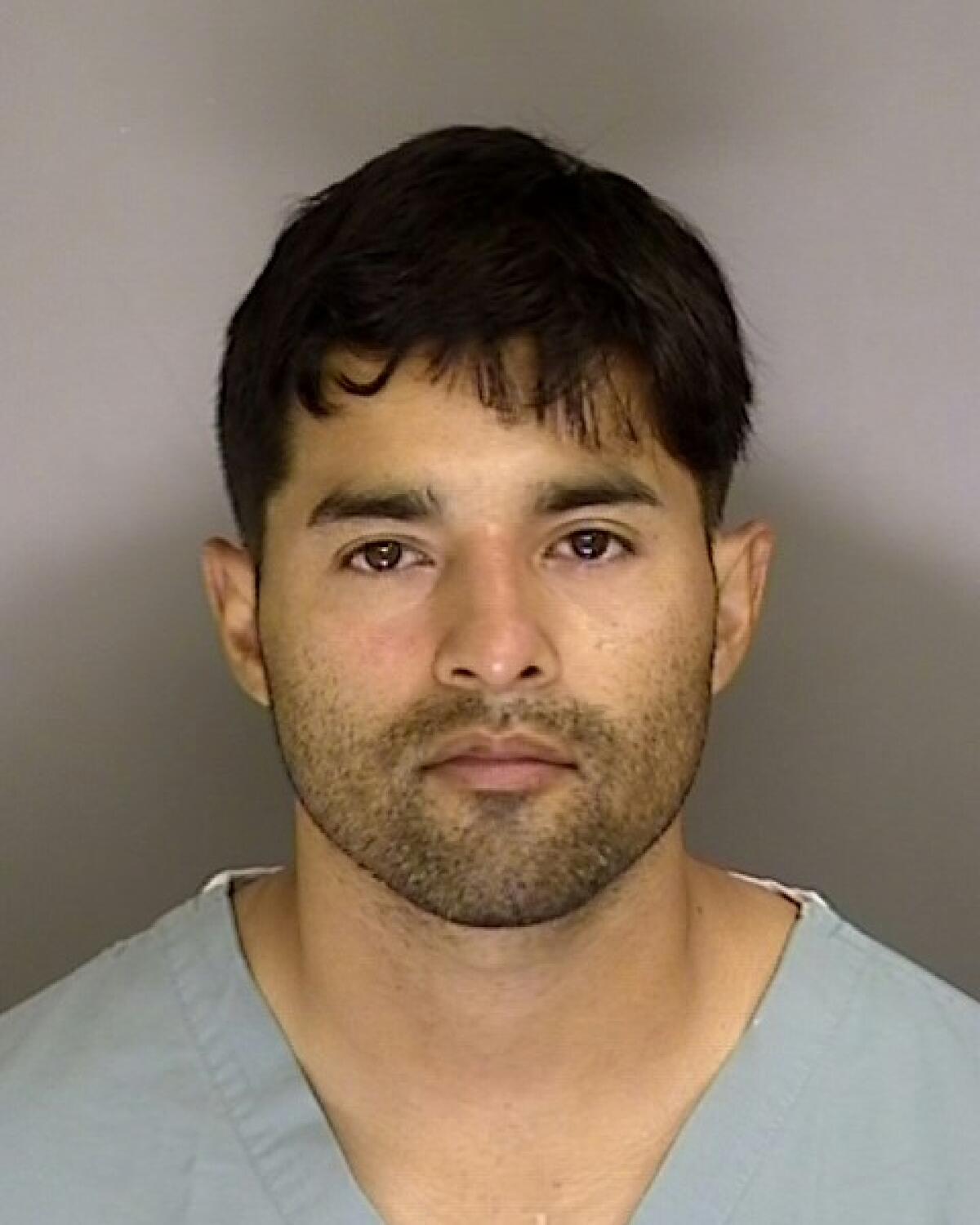Four extremist ‘Grizzly Scouts’ indicted on charges of obstructing federal probe into deadly shootings

- Share via
Four members of a Northern California militia were indicted Friday for allegedly obstructing justice and destroying records related to the May shooting death of a federal officer in Oakland by another member of their extremist group.
The federal indictment unsealed Friday revealed that the shooting suspect, Steven Carrillo, told fellow members of the militia via a secured message app that he killed a federal officer, and he warned them that he was about to engage Santa Cruz sheriff’s deputies in a gun battle during which he would kill another law enforcement officer. His compatriots immediately began covering up their association, authorities allege.
Along with Carrillo, the men, Jessie Alexander Rush, 29, of Turlock; Robert Jesus Blancas, 33, a transient; Simon Sage Ybarra, 23, of Los Gatos; and Kenny Matthew Miksch, 21 of San Lorenzo; are members of an armed band that calls itself the “Grizzly Scouts.” The group is associated with the “boogaloo” movement, a loose collection of extremists who wear Hawaiian shirts and espouse dismantling the government through violence, according to U.S. Justice Department officials.
Attorneys for Carrillo and Blancas did not return requests for comment, and lawyers for others could not immediately be located.
The complex conspiracy began to unwind in June, when federal law enforcement officials charged Carrillo, an Air Force sergeant, and suspected accomplice Robert A. Justus Jr., 30, in the May 29 shooting death of a federal security officer in Oakland and the wounding of a second officer.
After the killing of George Floyd by a Minneapolis police officer in May, Oakland was thrust into weeks of civic unrest. Authorities allege that Carrillo and Justus used the chaos as cover in their plan to attack law enforcement — a fantasy of boogaloo adherents. Federal authorities say Justus drove a white van with its license plates removed while Carrillo fired at the officers out its side door, using a homemade machine gun — a so-called ghost gun because of its lack of identifying markings — with a silencer.
The killing led to an eight-day manhunt that ended in the Santa Cruz mountain town of Ben Lomond, where Carrillo lived. There, he allegedly opened fire on deputies, killing Sgt. Damon Gutzwiller, the Sheriff’s Department said. Wounded during the gunfight, Carrillo fled and carjacked a vehicle, using his own blood to write “BOOG” on the hood before authorities apprehended him.
Justus turned himself in to federal authorities days later, but claimed he was an unwilling participant. The indictment does not identify Justus as a member of the Grizzly Scouts.
The indictment alleges that Rush, Blancas, Ybarra and Miksch used WhatsApp to communicate in the minutes before Carrillo opened fire on the Santa Cruz deputies, and in subsequent days sought to cover up their association with him by erasing evidence.
“Kit up and get here,” Carrillo allegedly wrote to his compatriots as the deputies arrived. “there’s inly (sic) one road in/out. Take them out when theyre coming in...”
Rush immediately told Carrillo to “factory reset” his phone, according to the complaint, which would have destroyed stored communications. The other militia members later deleted those communications from their own devices, including another message from Carrillo that day that read, “Dudes i offed a fed.”
Air Force Sgt. Steven Carrillo, charged with the killing of a sheriff’s sergeant, now faces federal charges in the Oakland slaying of a federal officer.
Later, Blancas also deleted Dropbox files related to the Grizzly Scouts, including what appeared to be a nondisclosure agreement requiring members to maintain confidentiality of the group’s materials, and scorecards to assess members’ skills in areas such as firearms and combat.
Authorities allege the group had formed only months before the attack — Rush founded the Grizzly Scouts last spring and granted himself the titles of “Commanding Officer,” and “Major,” according to the complaint. Blancas, who also went by the monikers “MuskOx” and “Orgotloth” was in charge of security and intelligence, while Ybarra handled recruitment and Miksch, who used the name “Senapai,” and handled firearms and training.
Carrillo, dubbed “Armadillo” and “Dillo,” was also a member, joining in on their Facebook discussions in a group named “/K/alifornia Kommando.”
Blancas was separately indicted late last year on charges related to child pornography and enticement of a minor after federal officers searched multiple locations associated with him and other Grizzly Scouts members on Aug. 6 while investigating the conspiracy. Along with two assault rifles, a pistol, body armor and other tactical equipment, authorities found electronic devices that contained evidence of child pornography.
Authorities allege Blancas met a 15-year-old middle school girl in an online forum labeled “DDLG,” short for Daddy-Daughter Little Girl, on Whisper, a platform that allows users to remain anonymous. From there, Blancas began communicating with her through the instant messaging platform Kik, and through calls and videos on Skype, the criminal complaint alleges. Though the girl originally told Blancas she was an adult, authorities allege he had similar interactions with other minors.
All six men remain in custody pending ongoing trials. Carrillo and Justus could face the death penalty.
Devin Burghart, executive director of the Institute for Research & Education on Human Rights, said the charges help “break down that myth that Carrillo was a lone actor.”
Brian Levin, executive director of Cal State San Bernardino Center for the Study of Hate and Extremism, said the Grizzly Scouts have been on the radar for extremist watchers for months.
“This is not the first time the name has come up,” he said. Northern California, he said, has become a hub of extremist antigovernment activity, though much of the boogaloo element shares little beyond a love of the 2nd Amendment and a hatred of organized government. “It is a bring your own plate to the extremist buffet,” Levin said.
Levin called Friday’s indictment a “very significant” development in the government crackdown on such groups, which have become a focus for law enforcement after the Jan. 6 insurrection in Washington, where multiple extremist groups were involved.
More to Read
Sign up for Essential California
The most important California stories and recommendations in your inbox every morning.
You may occasionally receive promotional content from the Los Angeles Times.













